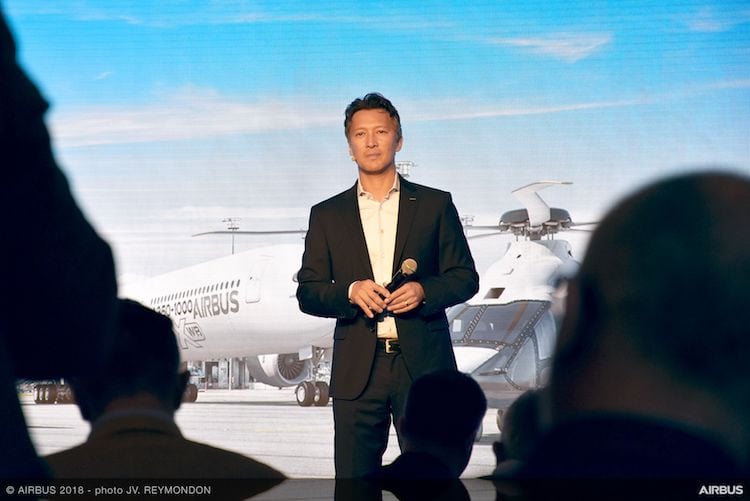
Dirk Hoke, CEO of Airbus Defense and Space, speaking at a pre-Farnborough media briefing. Photo courtesy of Airbus
European OEMs should be working together rather than competing to build Europe’s future air combat system (FCAS), according to Airbus Defense and Space CEO Dirk Hoke.
During a pre-Farnborough media briefing, Hoke outlined the challenges and opportunities facing Europe’s aerospace and defense community as it works toward developing a sixth-generation fighter jet over the next two decades.
The defense ministers of Germany and France signed letters of intent during a June 19 bilateral meeting to provide guidance in the development of FCAS. About two months before that, an FCAS agreement was signed between Airbus and Dassault at April’s Berlin Air Show. The goal for the two companies is to eventually replace the current generation of Eurofighter and Rafaele jets.
Looking to the future, Hoke said Airbus wants to avoid the competition between OEMs that in the past led to Dassault’s Rafaele, the Airbus Eurofighter and the Saab Gripen. All three jets have amassed a combined 1,129 orders between them. However, Hoke believes that technologically and economically, the best path forward is a multi-OEM sixth-generation jet used across Europe.
“Even when we’re optimistic for decades to come for orders of Eurofighter, more important is that we unite and go for European solution for sixth-generation aircraft,” Hoke said.
Upon announcing their collaboration, Airbus and Dassault proposed developing demonstrator aircraft for FCAS by 2025. Hoke said developing more than one sixth-generation fighter aircraft would drop Europe into the “second league” on the global stage.
The Airbus defense executive also emphasized that FCAS needs to be more than just an aircraft. Instead, it will be a “system of systems” approach, using artificial intelligence, drones and advanced communications capabilities.
“It’s not only the sixth-generation aircraft,” Hoke said. “Today’s systems and future systems need to be working hand-in-hand in real-time connectivity and connection and communication that needs to include artificial intelligence to steer swarms of drones and connect the different platforms on information. There is a huge change in the warfare of the future.”
Hoke went on to note the uncertainty over Brexit and whether or not that would mean BAE Systems would become a partner with Airbus and Dassault in the future development of FCAS. BAE and Dassault were previously working on a joint feasibility study, also named FCAS, funded by the British and French governments. Hoke called the U.K. a key partner for FCAS and expressed optimism that BAE Systems could join the collaboration.
With Airbus and Dassault still in the earliest stages of planning for FCAS, the technological capabilities of the sixth-generation fighter jet are still unknown. However, a November 2017 promotional video released by Airbus gave a brief overview of capabilities it is considering. Among them were a synthetic aperture radar capable of identifying enemy targets and the ability to operate in a manned-unmanned teaming mode with autonomous vehicles.